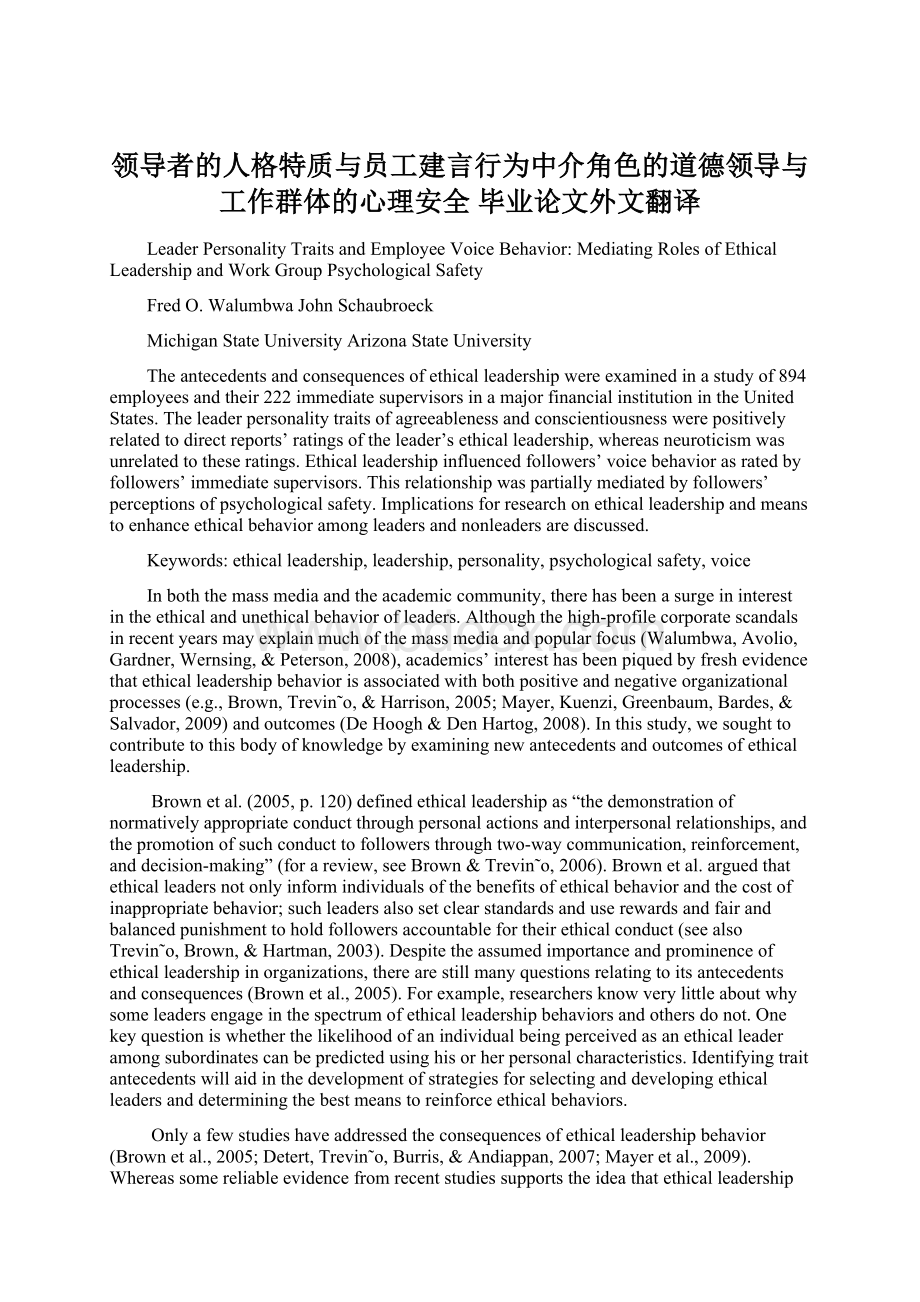领导者的人格特质与员工建言行为中介角色的道德领导与工作群体的心理安全毕业论文外文翻译Word格式.docx
《领导者的人格特质与员工建言行为中介角色的道德领导与工作群体的心理安全毕业论文外文翻译Word格式.docx》由会员分享,可在线阅读,更多相关《领导者的人格特质与员工建言行为中介角色的道德领导与工作群体的心理安全毕业论文外文翻译Word格式.docx(8页珍藏版)》请在冰豆网上搜索。

MichiganStateUniversityArizonaStateUniversity
Theantecedentsandconsequencesofethicalleadershipwereexaminedinastudyof894employeesandtheir222immediatesupervisorsinamajorfinancialinstitutionintheUnitedStates.Theleaderpersonalitytraitsofagreeablenessandconscientiousnesswerepositivelyrelatedtodirectreports’ratingsoftheleader’sethicalleadership,whereasneuroticismwasunrelatedtotheseratings.Ethicalleadershipinfluencedfollowers’voicebehaviorasratedbyfollowers’immediatesupervisors.Thisrelationshipwaspartiallymediatedbyfollowers’perceptionsofpsychologicalsafety.Implicationsforresearchonethicalleadershipandmeanstoenhanceethicalbehavioramongleadersandnonleadersarediscussed.
Keywords:
ethicalleadership,leadership,personality,psychologicalsafety,voice
Inboththemassmediaandtheacademiccommunity,therehasbeenasurgeininterestintheethicalandunethicalbehaviorofleaders.Althoughthehigh-profilecorporatescandalsinrecentyearsmayexplainmuchofthemassmediaandpopularfocus(Walumbwa,Avolio,Gardner,Wernsing,&
Peterson,2008),academics’interesthasbeenpiquedbyfreshevidencethatethicalleadershipbehaviorisassociatedwithbothpositiveandnegativeorganizationalprocesses(e.g.,Brown,Trevin˜o,&
Harrison,2005;
Mayer,Kuenzi,Greenbaum,Bardes,&
Salvador,2009)andoutcomes(DeHoogh&
DenHartog,2008).Inthisstudy,wesoughttocontributetothisbodyofknowledgebyexaminingnewantecedentsandoutcomesofethicalleadership.
Brownetal.(2005,p.120)definedethicalleadershipas“thedemonstrationofnormativelyappropriateconductthroughpersonalactionsandinterpersonalrelationships,andthepromotionofsuchconducttofollowersthroughtwo-waycommunication,reinforcement,anddecision-making”(forareview,seeBrown&
Trevin˜o,2006).Brownetal.arguedthatethicalleadersnotonlyinformindividualsofthebenefitsofethicalbehaviorandthecostofinappropriatebehavior;
suchleadersalsosetclearstandardsanduserewardsandfairandbalancedpunishmenttoholdfollowersaccountablefortheirethicalconduct(seealsoTrevin˜o,Brown,&
Hartman,2003).Despitetheassumedimportanceandprominenceofethicalleadershipinorganizations,therearestillmanyquestionsrelatingtoitsantecedentsandconsequences(Brownetal.,2005).Forexample,researchersknowverylittleaboutwhysomeleadersengageinthespectrumofethicalleadershipbehaviorsandothersdonot.Onekeyquestioniswhetherthelikelihoodofanindividualbeingperceivedasanethicalleaderamongsubordinatescanbepredictedusinghisorherpersonalcharacteristics.Identifyingtraitantecedentswillaidinthedevelopmentofstrategiesforselectinganddevelopingethicalleadersanddeterminingthebestmeanstoreinforceethicalbehaviors.
Onlyafewstudieshaveaddressedtheconsequencesofethicalleadershipbehavior(Brownetal.,2005;
Detert,Trevin˜o,Burris,&
Andiappan,2007;
Mayeretal.,2009).Whereassomereliableevidencefromrecentstudiessupportstheideathatethicalleadershiphasarangeoffavorableoutcomes(e.g.,Brownetal.,2005;
Mayeretal.,2009),Detertetal.(2007)foundnorelationshipbetweenethicalleadershipandfoodshrinkage,anindexofcounterproductivebehavioramongrestaurantemployees.Somepsychologicalmechanismsthatmayexplainthemorefavorableeffectsofethicalleadershiphavebeendiscussed(seeBrown&
Trevin˜o,2006),butlittleempiricalattentionhasbeendirectedtowardunderstandingthepsychologicalprocessesthatmaydifferentiatethebehavioroffollowersofethicalleadersfromthatoffollowersoflessethicalleaders.Aclearerunderstandingofthemechanismsbywhichethicalleadershipinfluencesoutcomesisnotonlyneededforthepracticalconcernsofselectingfor,developing,andmotivatingethicalleadership;
suchinformationwouldalsobevaluablefordeterminingwhethertheconstructdevelopedbyBrownandTrevin˜oandtheircolleaguescontributessomethinggenuinelynewtoleadershipresearchandpractice.
Withtheselimitationsoftheextantliteratureinmind,wehadthreeaimsinthepresentstudy.First,weidentifiedindividualtraitsthatwereexpectedtoinfluenceethicalleadership.Wechosetofocusonhowleaderpersonalityrelatestofollowerratingsoftheleader’sethicalbehaviorfortworeasons.Brownetal.(2005)andBrownandTrevin˜o(2006)proposedthatthreepersonalitytraits—conscientiousness,agreeableness,andneuroticism—areplausibleantecedentsofethicalleadership.Personalityantecedentsmaybeuniquelysuitedtopredictingethicalleadership,becauseethicalbehaviorreflectsvariationinindividuals’deep-seatedvaluesandbeliefs;
thus,ethicalleadershipshouldbeabehavioralpatternthatisveryconstantacrosssituationsandovertime.
Second,thepresentstudycontributestotheemergingtheoreticalandempiricalresearchonethicalleadershipbyexaminingindividual-andgroup-leveloutcomesthathavebeenestablishedtohaveimportantimplicationsforworkunitfunctioning:
workgrouppsychologicalsafety(Edmondson,1999)andemployeevoicebehavior(LePine&
VanDyne,1998).Finally,ourstudytestedwhetherfollowers’perceptionsofpsychologicalsafetymediatedtherelationshipbetweenethicalleadershipandvoicebehavior.Weintegratedthesevariousfactorsinatheoreticalmodelthatwetestedusingdatafromdistinctsources.Figure1summarizestheconceptualmodelexaminedinthepresentstudy.
TheoryandHypothesisDevelopment
EthicalLeadership,PsychologicalSafety,andEmployeeVoice
Employeevoiceisdefinedas“promotivebehaviorthatemphasizesexpressionofconstructivechallengeintendedtoimproveratherthanmerelycriticize”(VanDyne&
LePine,1998,p.109).Itconcernsthebottom-upprocessofrank-and-fileemployeesmakinginnovativesuggestionsforchangeandrecommendingmodificationstostandardprocedures.Voicebehaviorisanimportantcomponentofextrarolebehavior(i.e.,thosepositiveanddiscretionarybehaviorsthatarenotrequiredbytheorganizationbutthatarenecessarytofacilitateeffectiveorganizationalfunctioning;
Organ,Podsakoff,&
MacKenzie,2006).Mayeretal.(2009)foundthatethicalleadershipwasasignificantpredictorofgroup-levelhelpingbehavior,whichisadistinctdomainofextrarolebehavior.Likehelpingbehavior,constructivevoicebehaviorshouldbevaluedbyleadersbecauseitcanrevealproblemsandsolutionstoproblemsaswellaspointtootherideasthatmayhelpworkunitfunctioning(VanDyne&
LePine,1998).
Oneofthecentralpredictionsofethicalleadershiptheoryisthatethicalleaders“providefollowerswithvoice”(Brownetal.,2005,p.120).Ethicalleadersspeakoutpubliclyagainstinappropriateorganizationalactionsandbehaviorsandemphasizedoingtherightthing.Fromasociallearningperspective(Bandura,1977),whenleadersproactivelycreateafairworkenvironment,theybecomeatargetofemulation(Brownetal.,2005).Becauseethicalleadersconveyhighmoralstandardstoemployees,theyencouragetheirfollowerstovoiceopinionsandsuggestions,notonlyaboutethicalmattersbutalsoaboutotherwork-relatedprocessesandworkcontext.Insupportofthislinkage,Brownetal.foundthatethicalleadershipwassignificantlyrelatedtomembers’willingnesstoreportproblemstomanagement.ThisisonlyoneaspectofVanDyneandLePine’s(1998)voicebehaviorconstruct.Inaddition,voicebehaviorincludesexpressingdissentwhenemployeesperceivethatcertainactionswouldbeinappropriateorunethical,aswellassharingconstructiveideasforworkunitimprovementsevenwhenproblemshavenotsurfaced.Onthisbasis,wepredictedthatethicalleadershipwouldpromotevoicebehaviorinworkUnits.
Hypothesis1:
EthicalleadershipispositivelyrelatedtovoiceBehavior.
Psychologicalsafetyreferstosharedbeliefsamongworkunitmembersthatitissafeforthemtoengageininterpersonalrisktaking(Edmondson,1999).AccordingtoEdmondson,psychologicalsafetygoesbeyondperceivingandexperiencinghighlevelsofinterpersonaltrust;
italsodescribesaworkclimatecharacterizedbymutualrespect,oneinwhichpeoplearecomfortableexpressingtheirdifferences.Leadersarepivotalforremovingtheconstraintsthatoftendiscouragefollowersfromexpressingtheirconcernsandotherideas.Inenvironmentscharacterizedbyhighpsychologicalsafety,leadersalsoactivelycommunicatetheimportanceofsuchbehaviorandguaranteethatitwillnothavenegativerepercussionsfortheindividualortheworkunitasawhole.Inthisrespect,ethicalleadershipmaybeparticularlyimportant,andyetthisfunctionisunderappreciatedintheliterature.Highlyethicalleadersvaluehonestandtruthfulrelationshipswiththeirfollowers(Brownetal.,2005).Theyareseentoactaccordingtotheirfundamentalvaluesandbeliefs,ratherthantorespondtoexternalpressuresornarrowandtransitoryinterests.Whenleadersinteractwithfollowerswithopennessandtruthfulness,interpersonaltrustandmutualrespectispromotedbothbetweenfollowersandtheleaderandamongthefollowersthemselves.
Providingapsychologicallysecureenvironmentforemployeescanbeadouble-edgedswordforleaders,however.Whereasfavorablesolutionsmayresult,leadersoftenmustacknowledgefeedbackthatisnotconsistentwiththeirplansandwishes.Theleadersmustallowdissentdespitethepressuresandcomplicationsitentailsandresistthet